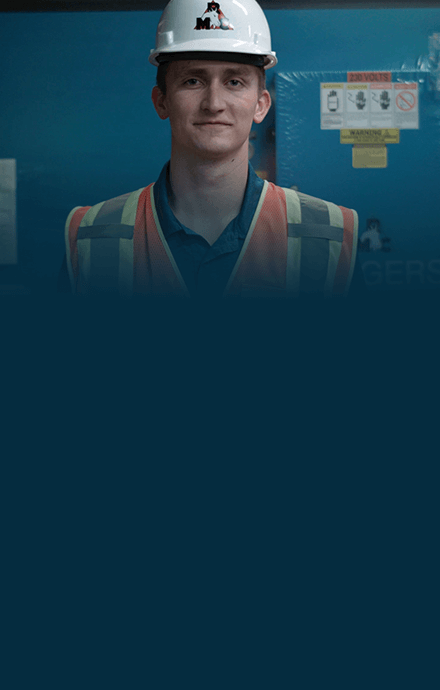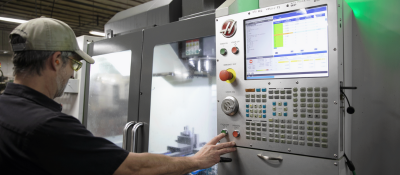Your Cart is Empty

Pacific Northwest Winery Integrates Compressed Air System for Sustainable Wine Production
Compressed air is used throughout the winemaking process, though its uses can vary based on how each winery operates. One new winery in Walla Walla, Washington State’s wine-making hotbed, chose Rogers as their compressed air partner from the beginning to provide quality compressed air, low-maintenance equipment, and reliable service.
Washington is the second-largest wine-producing state in the United States. The state boasts over 1,050 wineries, and in 2024, harvested 270,000 tons of grapes. The Walla Walla area in Southeast Washington has been referred to as the Mecca of Washington wines, with over 200 wineries populating the area.
From crushing & pressing grapes to fermentation control, many wineries rely on compressed air to create quality wine. Echolands, a newly built winery in Washington State, uses high-quality compressed air to make sustainable, delicious wines.
Customer Background
Echolands Winery is a medium-sized winery created in 2018 in Walla Walla, Washington’s wine-making capital. The winery makes 12,000 cases of wine per year and is known for its Cabernet Franc. Echolands’ goal is to make responsibly produced wines without pesticides or herbicides. In 2021, the winery earned Washington State’s Sustainability badges for producing goods while being conscious of the native flora and fauna. Echolands utilizes composting, earthworm-powered water filtration, goats & sheep, and even a falconer to keep rodents away.
The winery sits on 340 acres of farmland that historically was used to grow wheat and peas. Now, 70 acres have been converted to grapevines. In addition to these vineyards, Echolands also grows grapes at a 25-acre vineyard across the Walla Walla Valley.

A map of Echolands Winery shows the vineyards, sustainability efforts, and future plans.
How is Compressed Air Used in Winemaking?
Winemaking utilizes compressed air in several ways. Many processes of winemaking —conveying or running pneumatic machinery, for example — utilize plant air, which does not come in contact with the grapes or final product of wine. Echolands Winery is one great example.
At Echolands, compressed air plays a big role, especially during the harvest. The winery uses compressed air in 3 main areas:
- To power their press to load and unload it quickly and quietly
- To power fermentation pumps
- To power pulse air, which pumps high-capacity compressed air into a fermenting tank with grapes and juice mixed together, leading to textural gains in red wines

Brian Rudin, General Manager of Echolands, is responsible for making wine, growing grapes, vineyard relations, and more. He’s also a certified sommelier with more than 17 years of experience in the Washington wine industry.
Rudin has worked at Echolands since the blueprints were drawn up in 2018. When the winery was built, compressed air wasn’t included in the blueprints, but Rudin knew they’d need it.
"Compressed air is so important for doing things quickly and clean and efficiently, that we knew we just had to have it as part of our design," Rudin said.
RELATED: WHAT IS A COMPRESSED AIR SYSTEM?
Relying on Compressed Air for Wineries
With so many systems relying on compressed air, having a reliable supplier is paramount. During construction, the winery’s general contractor recommended Rogers Machinery to Echolands. The contractor has been established in Washington for winery builds, and Echolands trusted their expertise when selecting a compressed air supplier.
During the harvest season, a shutdown of the system could be catastrophic after just a couple of days. Rudin has several small, mobile compressors on hand for worst-case scenarios, but they still risk losing product.
“The most sensitive time for us for the compressor to go out would be at harvest. All of our work is accelerated in the months of September and October when we're bringing in fresh grapes, and that's the window where we rely on compressed air the most,” Rudin said.

The winery's compressed air system includes the following:
- Rogers KR-40 oil-lubricated compressor with outdoor weather protection
- Hankison FLEX refrigerated dryer
- Parker Finite coalescing pre-filter
- 400-gallon vertical receiver tank
- Powerex Scroll Package to manage humidity in the barrel room
The low-maintenance aspect of their compressed air system is perhaps the best part.
“For all the many systems that we run, our air compressor systems, both of them, and the filtration and the drying systems have worked marvelously. They're some of the most reliable and least fussy, lowest maintenance machines we have,” Rudin said.
Rogers compressed air systems like the one at Echolands can be enrolled in a factory service program, taking the responsibility of scheduling regular maintenance off facilities’ to-do lists.
“One of the things I appreciate the most is Rogers Machinery has reached out several times just checking in with us and just seeing if we’re ready for those service updates,” Rudin said.

The Powerex unit controls the humidity in the barrel room.
Plant Air vs. Process Air
The system Echolands selected needed to be used for process air, which makes direct contact with their product. Air that does not make contact with the product is called plant air and does not need to meet high ISO standards like process air does. Because Echolands is using process air in their facility, their compressed air system contains Rogers Food Grade Lubricant to meet food & beverage standards.
RELATED: IN THE SPIRIT OF IMPROVEMENT: NATION'S OLDEST DISTILLER TAKES PRACTICAL APPROACH TO COMPRESSED AIR SYSTEM UPGRADE
Next Steps for Echolands
The winery is currently cultivating more vineyards, aiming to grow even more sustainable grapes & produce wine that shows off the beauty of the Walla Walla area. With future vineyards already being planted on their 340 acres, the winery is set to make big gains in the future.
Nitrogen Generation in Winemaking
Many wineries also generate nitrogen to aid in the bottling process: generating nitrogen requires compressed air. By passing filtered air through a nitrogen membrane unit, nitrogen molecules separate from other gases, stored in a tank for later use.
Generating nitrogen ensures that the facility always has nitrogen on hand, but won’t be overpaying for bulk nitrogen delivery that is inherently inefficient, as dewars must vent to atmosphere to maintain proper pressure. For applications like breweries and wineries, nitrogen generation is pure, on-demand, and efficient.
Currently, Echolands Winery is just under the bottling threshold where generating its own nitrogen is financially viable. They currently use a mobile bottling truck connected to their hoses and nitrogen canisters, but plan to partner with Rogers to utilize nitrogen generation as they grow.
RELATED: WINERY DOUBLES PRODUCTION WITH NITROGEN GENERATION UPGRADES

Echolands is growing not just grapes. They’re growing a community rooted in sustainability and love for delicious, local wines. Low-maintenance, reliable compressed air is helping them get there.





